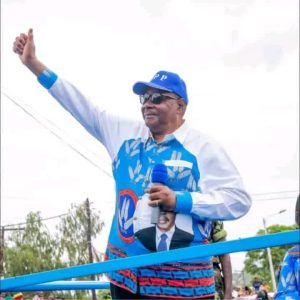
By Kassim Kajosolo
Former Malawi president Peter Mutharika is within touching distance of reclaiming the presidency he lost in a 2020 court-ordered rerun, with partial results from the 16 September vote showing him in a commanding lead over incumbent Lazarus Chakwera.
According to the Malawi Electoral Commission (MEC), results from 24 of the country’s 36 councils give the 85-year-old Democratic Progressive Party (DPP) leader 2,138,746 votes or 66.7% of the 3.2 million valid ballots counted so far. With 7.2 million registered voters nationwide, the winning threshold stands at about 2.34 million votes (50% plus one), leaving Mutharika just 205,841 votes short of outright victory from the remaining 12 councils.
Chakwera, 70, of the Malawi Congress Party (MCP), trails far behind with just over 20% of the vote. To overturn Mutharika’s lead, he would need an improbable 1.6 million votes from the councils yet to be announced, an outcome that defies historical voting patterns.
Mutharika’s surge is rooted in his overwhelming dominance in the Southern Region, his traditional power base. In Thyolo district, he garnered 200,131 votes against Chakwera’s meagre 2,943, while in Machinga he won 177,387 votes compared to Chakwera’s 4,541. By contrast, Chakwera’s strongholds in the Central Region, such as Dowa where he secured 216,091 votes, have not produced margins large enough to counter the southern landslide.
This election has been widely viewed as a referendum on Chakwera’s turbulent five-year tenure. His administration has faced stubborn inflation above 20% for three consecutive years, chronic fuel shortages, and a deepening cost-of-living crisis. The devastation of Cyclone Freddy in 2023 only compounded the economic strain, eroding public confidence in his leadership.
Analysts argue that while economic hardship shaped voter sentiment, Malawi’s enduring regional and ethnic dynamics remain equally decisive. “For the time being, it’s still going to be ethnicity, still going to be region,” political analyst Henry Chingaipe told SABC News.
The MEC confirmed on Monday that results from all 36 councils have reached the national tally centre at the Bingu International Convention Centre in Lilongwe, though disputes in a handful of districts are still under review. Chairperson Annabel Mtalimanja emphasised that the commission would prioritise accuracy over speed, reminding Malawians that the law provides up to eight days for the final declaration.
Memories of the annulled 2019 elections loom large, but so far this year’s polls have been praised for their transparency and calm. Local observers, along with an African Union, Common Market for Eastern and Southern Africa mission, lauded the process for strong logistics and inclusivity, while also calling for deeper electoral reforms.
Even so, tensions remain high. The electoral body has warned against disinformation and premature celebrations, insisting that “no tactic, whether street parties or protests, will pressure the commission to declare before due process.”
Chakwera’s MCP has filed complaints alleging irregularities, but several other candidates have already conceded defeat. Dalitso Kabambe of the United Transformation Movement (UTM) went a step further by congratulating Mutharika.
Should the DPP leader be officially declared winner, it would mark one of the most dramatic political reversals in Malawi’s history, a comeback for the octogenarian statesman and a harsh verdict on Chakwera’s troubled presidency. For the MEC, however, the challenge lies not only in announcing the results swiftly but ensuring the credibility of the process to preserve national trust.
Meanwhile Zodiak has reported that former president Dr. Bakili Muluzi has asked president chakwera to accept defeat and move on.
He has said Chakwera should call Mutharika and congratulate him on his waited victory so that peace should be maintained.



